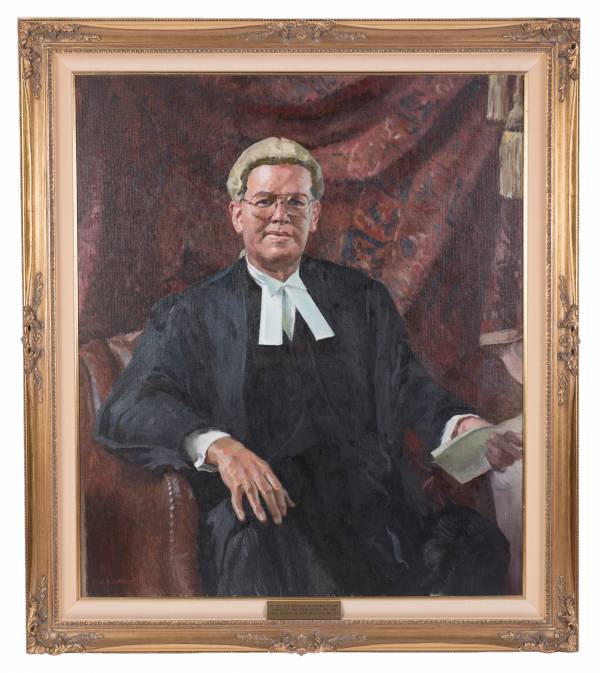
Former Chief Justice Sir Thomas Eichelbaum has died, aged 87.
Chief Justice Sian Elias says serving and former members of the judiciary have been deeply saddened to hear of his death.
Dame Sian says Sir Thomas was a reforming leader of the judiciary who modernised courts administration during his time in office.
"He was held in the highest affection by the judges who served under him both for his leadership and for his personal warmth and kindness. He was greatly admired as a very fine judge."
Sir Thomas' funeral will be a private family affair.
Law Society tribute
The legal profession will be saddened at news of the death of Sir Thomas Eichelbaum, New Zealand Law Society President Kathryn Beck says.
“Sir Thomas was Chief Justice from February 1989 to May 1999. He was the first Chief Justice who had served as a member of the judiciary before his appointment. He was an excellent administrator who was respected by all as a person of integrity who was also willing to consult and seek advice where necessary. The Criminal Appeal Division of the Court of Appeal was established during Sir Thomas’ time as Chief Justice and this was a very successful initiative. A humble and very approachable man, his time as Chief Justice was viewed as one where the efficiency of our courts was greatly enhanced.
“Sir Thomas was also President of the New Zealand Law Society from 1980 to 1982. Before that he had been very active in the legal profession and was a key player in enactment of the Law Practitioners Act 1982, which made what were very progressive changes at the time to the regulatory requirements of the profession.
“On his retirement as President, the Law Society’s Council’s tribute to him included the statement that he was a ‘very friendly, humane and cheerful and essentially, modest man’. By all accounts that summed him up.
“Sir Thomas arrived in New Zealand in 1938 at the age of seven, a refugee from Nazi Germany. His rise to prominence in the legal profession and the judiciary from such a beginning is in itself a statement of his determination and ability. We have lost an important contributor to our justice system.”
Born in Germany
Sir Thomas was born in Koeningsberg, Germany on 17 May 1931 to Dr Walter and Frida Eichelbaum. Sir Thomas’ family left Germany in 1938 to escape the Nazi regime and came to New Zealand.
He was educated at Hutt Valley High School before completing an LLB at Victoria University of Wellington in 1954. He then moved into private practice in Wellington.
Sir Thomas married Vida Beryl Franz in 1956 and they had three sons. He was admitted as a barrister and solicitor in 1953.
He became a litigation partner at Chapman Tripp and Co in Wellington in 1958 and remained so until 1978, when he moved to practise as a barrister. He was appointed Queen’s Counsel the same year. While in legal practice he lectured in civil procedure at Victoria University of Wellington and was an assessor for New Zealand in commercial law, a member of the High Court Procedure Research Committee from 1969, and a member of the High Court Rules Committee from 1969 to 1975.
His active career in law society affairs culminated with his election as President of the New Zealand Law Society from 1980 to 1982. A major interest during his term as President was the maintenance of professional competence and a credible public image in a time when the “traditional aura and mystique of professions” no longer sufficed.
He was appointed a Judge of the High Court on 29 October 1982 and as an additional judge of the Court of Appeal in 1984. This was followed in 1989, when he was aged 58, with appointment as Chief Justice of New Zealand. It was the first time that the Chief Justice had been appointed from the ranks of the already-serving judiciary. His judicial appointment was recognised with appointment as Knight Grand Cross of the order of British Empire (GBE) on 6 February 1989, and appointment to the Privy Council later in 1989.
During his time as Chief Justice he was responsible for a number of reforms and changes to our court system. This included establishment of the Criminal Appeal Division of the Court of Appeal, the abolition of wigs in the High Court, and the introduction of computers into proceedings.
He retired as Chief Justice on 17 May 1999. He was awarded an honorary LLD from Victoria University in the same year. He continued to make a substantial contribution to New Zealand on his retirement by leading a number of investigations. Several of these proved to be controversial and Sir Thomas’ judicial career and performance was probably seen as equipping him for a difficult task.
Appointed to head a ministerial inquiry into the conviction of childcare worker Peter Ellis in March 2000, Sir Thomas’s findings were released in March 2001. His report upheld the guilty verdicts and was widely criticised.
Sir Thomas chaired the Royal Commission on Genetic Modification from 2000 to 2001, with the Commission presenting a comprehensive report in July 2001. He also carried out an independent inquiry into New Zealand’s loss of co-hosting rights for the 2003 Rugby World Cup. His report was released in July 2002 and concluded that the New Zealand Rugby Football Union seemed unprepared for the role of host. The Union’s Chairman, Chief Executive and Vice President all resigned following his report.
